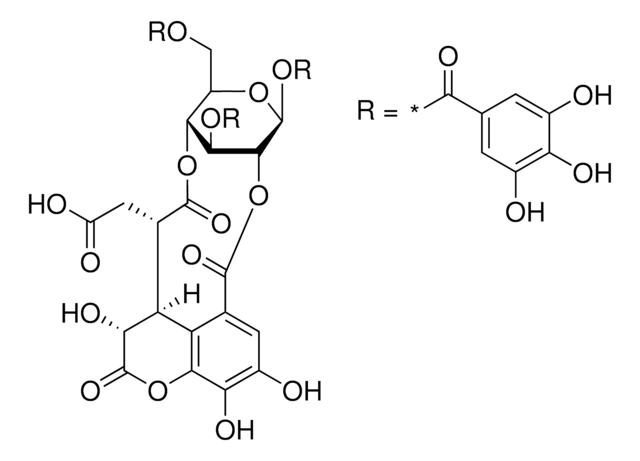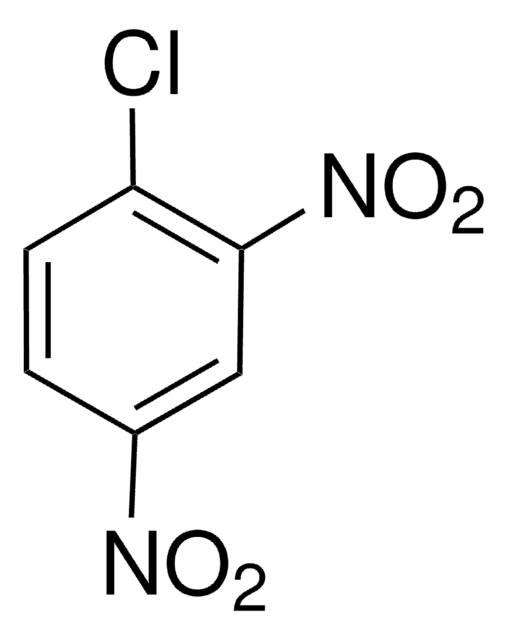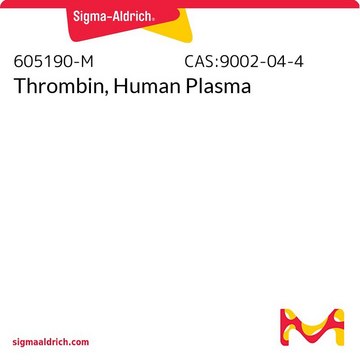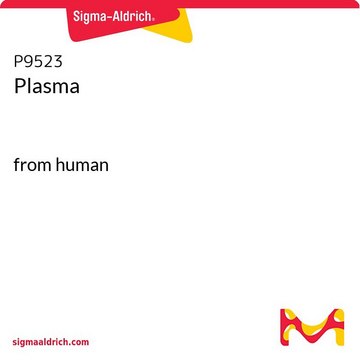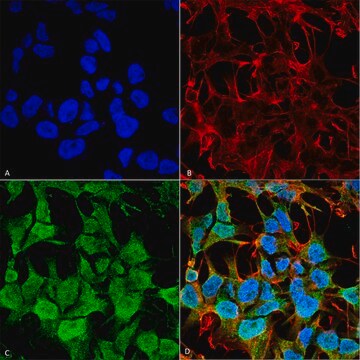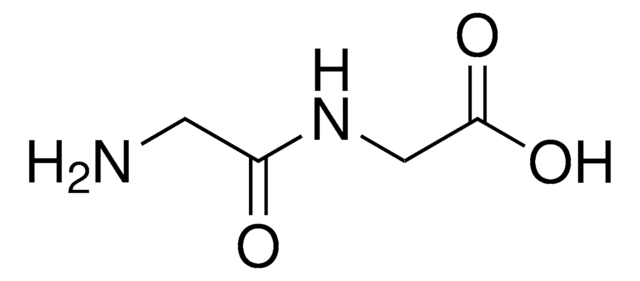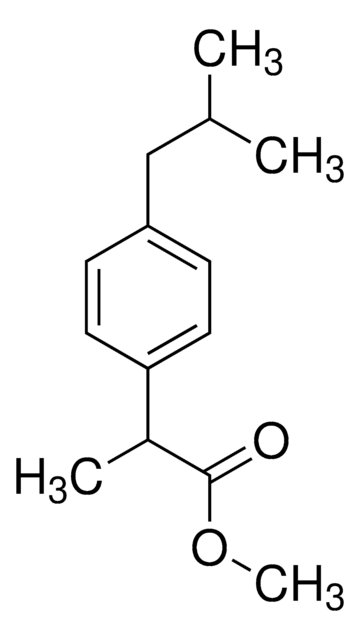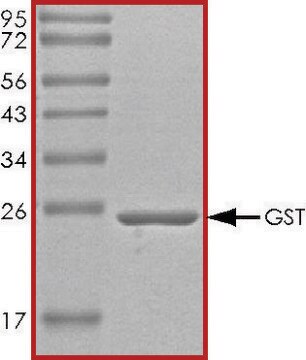GS60
GST A1-1, Recombinant Human
Sinonimo/i:
GST-epsilon, GST2, GSTA1-1, GTH1, glutathione S-transferase alpha 1
Autenticatiper visualizzare i prezzi riservati alla tua organizzazione & contrattuali
About This Item
Codice UNSPSC:
12352200
NACRES:
NA.26
Prodotti consigliati
Origine biologica
human
Livello qualitativo
Ricombinante
expressed in E. coli
Saggio
>95% (SDS-PAGE)
Forma fisica
frozen liquid
Attività specifica
21.04 units/mg protein
PM
23 kDa
Concentrazione
2.0 mg/mL
Temperatura di conservazione
−70°C
Informazioni sul gene
human ... GSTA1(2938)
Descrizione generale
using spectrophotometric determination of 1-chloro-2,4-dinitrobenzene (CDNB) conjugation with reduced glutathione (1 mM) in 100 mM NaPO4 (pH 6.5) at room temperature.
Azioni biochim/fisiol
Glutathione S-transferase alpha 1 (GSTA1) is an enzyme that in humans is encoded by the GSTA1 gene. Glutathione S-transferases (GSTs) are a family of enzymes that play an important role in detoxification by catalyzing the conjugation of many hydrophobic and electrophilic compounds with reduced glutathione. Based on their biochemical, immunologic, and structural properties, cytosolic and membrane-bound forms of glutathione S-transferase are encoded by two distinct supergene families. At present, eight distinct classes of the soluble cytoplasmic mammalian glutathione S-transferases have been identified: alpha, kappa, mu, omega, pi, sigma, theta and zeta. The GSTs are thought to function in xenobiotic metabolism and play a role in susceptibility to cancer, and other diseases.
The GSTA1 gene encodes a member of a family of enzymes that function to add glutathione to target electrophilic compounds, including carcinogens, therapeutic drugs, environmental toxins, and products of oxidative stress. This action is an important step in detoxification of these compounds. This subfamily of enzymes has a particular role in protecting cells from reactive oxygen species and the products of peroxidation. Polymorphisms in this gene influence the ability of individuals to metabolize different drugs. This gene is located in a cluster of similar genes and pseudogenes on chromosome 6. Alternative splicing results in multiple transcript variants.
Stoccaggio e stabilità
The enzyme should be used by the end-user customer within 1 year of receipt.
Codice della classe di stoccaggio
10 - Combustible liquids
Classe di pericolosità dell'acqua (WGK)
WGK 1
Punto d’infiammabilità (°F)
Not applicable
Punto d’infiammabilità (°C)
Not applicable
Certificati d'analisi (COA)
Cerca il Certificati d'analisi (COA) digitando il numero di lotto/batch corrispondente. I numeri di lotto o di batch sono stampati sull'etichetta dei prodotti dopo la parola ‘Lotto’ o ‘Batch’.
Possiedi già questo prodotto?
I documenti relativi ai prodotti acquistati recentemente sono disponibili nell’Archivio dei documenti.
I clienti hanno visto anche
Hong-Na Wang et al.
Clinical immunology (Orlando, Fla.), 160(2), 342-348 (2015-07-30)
Pulsed low-dose cyclophosphamide (CTX) therapy has become a very effective approach in improving the clinical outcomes of lupus nephritis (LN) patients. However, variations of CTX therapeutic outcomes in LN patients are incompletely understood. We investigated the contributions of known allelic
Chen Zong et al.
Journal of assisted reproduction and genetics, 31(3), 379-382 (2014-01-07)
Recurrent spontaneous abortion (RSA) is a multifactor and distressing disease. There are still approximately half of the RSA patients with cause not being identified to date. Accumulating studies have confirmed that genetic polymorphisms in glutathione S-transferases (GSTs) were associated with
Qiwen Deng et al.
Journal of B.U.ON. : official journal of the Balkan Union of Oncology, 20(1), 287-295 (2015-03-18)
Glutathione S-transferases (GSTs) are involved in the detoxification of carcinogens, and may be linked to carcinogenesis. As a vital component of GSTs, GSTA1 plays an important role in carcinogenesis. However, the studies about the effect of GSTA1 polymorphisms on cancer
Xue-Diao Pan et al.
Asian Pacific journal of cancer prevention : APJCP, 15(20), 8631-8635 (2014-11-07)
Glutathione S-transferase A1 (GSTA1) appears to be primarily involved in detoxification processes, but possible roles in lung cancer remain unclear. The objective of this study was to investigate the expression and function of GSTA1 in lung cancer cells. Real-time PCR
Gianfranco Spalletta et al.
Psychiatry research, 203(2-3), 180-183 (2012-09-11)
Oxidative damage in brain cells is one of the factors hypothesized to be involved in the pathogenesis of schizophrenia. Glutathione S-transferase (GST) A1*B polymorphism, a genotype associated with a higher risk of oxidative damage, is associated with increased frequency of
Il team dei nostri ricercatori vanta grande esperienza in tutte le aree della ricerca quali Life Science, scienza dei materiali, sintesi chimica, cromatografia, discipline analitiche, ecc..
Contatta l'Assistenza Tecnica.
